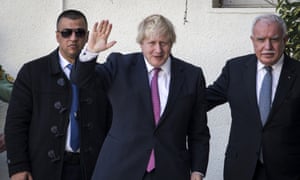From a hilltop in Masa’ada on the Israeli side of the Syrian border in the Golan Heights, Faried al-Said Ahmed surveys his cherry and apple trees 80 feet below. Barbed wire surrounds the steep hillside, preventing people entering a minefield planted when the Six-Day War ended 50 years ago.
Currently, the trees are bare. Cherry-picking season is May and June, while 45,000 tons of apples will leave this co-operative farm after they ripen in September and October.
Although Syrians are fighting less than three miles away and there’s the danger of being blown up underfoot, Ahmed has a more pressing concern: the European Union.
The co-operative sells fruit across Israel, but Ahmed claims the EU’s protection of its member states’ farms makes exports to Europe all but impossible. “If it were possible to sell in England then, my God, yes, we would,” he says.
The 52-year-old might soon get his wish. When article 50 is triggered in the coming days, the UK will be only two years away from negotiating its own trade deals. The focus has been on an agreement with the US, but given the probable complications of negotiating with self-proclaimed master dealmaker Donald Trump, Israel might be first to sign on the dotted line.
After talks in No 10 last month, Theresa May and Israel’s prime minister, Benjamin Netanyahu, announced a joint working group charged with “preparing the ground” for a trade deal.
The trade relationship between Israel and Britain is already worth £4.9bn, and on Wednesday foreign secretary Boris Johnson told press in Jerusalem as he stood beside Netanyahu: “We are … building a global identity as a Britain that’s coming out of the EU and we want to build on our trading partnership with you. We are the biggest European trading partner with Israel … We have the largest, fastest-growing Aston Martin dealership anywhere in the world here in Israel.”

At his official residence on the outskirts of Tel Aviv, the British ambassador, David Quarrey, points to a growing economic relationship between the countries in the past 18 months. This included the biggest UK-Israel trade deal in history: Rolls-Royce landed a £1bn contract to service and maintain its Trent 1000 engines for airline El Al and, in the other direction, Israeli defence firm Elbit Systems is in a consortium that provides the Ministry of Defence with training aircraft and simulators.
Quarrey says: “We’re seeing trading bilateral relationships between the UK and Israel, in science and trade for example, doing better than ever. But there’s the potential to do even better, particularly in the context of Brexit. I was with Theresa May and Benjamin Netanyahu in London and it was clear there was the determination for this.
“Most businesspeople in Israel look at the UK as a great place to do business, because of its culture, language, and the predictability of the regulatory and tax systems.”
Britain, in effect, outsourced trade negotiations to European bureaucrats in the 1970s, so the way the newly formed Department for International Trade (DIT) thrashes out the Israel deal could provide a template for other business agreements.
It is understood the first meeting of the working group will take place by the end of this month. Two to four people will represent each side, including officials from the DIT and Israel’s Ministry of Economy.
They will set the parameters for future discussions, expected to take place two or three times a year. Regulatory and industry experts will be brought in on an ad hoc basis thereafter.
At present, UK-Israel trade is covered by the latter’s association agreement with the EU. James Sorene, the chief executive at the Britain Israel Communications and Research Centre, says “the first priority will be to establish what preferential trade terms the UK is prepared to offer”.
Israelis are required to have work permits in the UK, though many are dual EU citizens and work freely in Britain. Given that this right would end on Brexit, Sorene points out: “If the UK’s exit arrangements with the EU involve restricted movement for EU nationals this could indirectly cut the flow of Israeli tech workers to the UK, unless the UK designs a special arrangement for Israel.”

Technology is booming in Israel: Google, Apple, Facebook, and Microsoft all have research centres there, and there are 300,000 hi-tech workers in a country of only 8.5 million people. The tech sector is likely to be prioritised during negotiations, alongside defence and pharmaceuticals – not least because one in seven NHS drugs come from Israel.
Ron Atzmon, managing director of ID authentication tech company Au10tix, wants the UK-Israel relationship to replicate aspects of the EU, with harmonisation of VAT rates and intellectual property regulations.
Coupled with more relaxed immigration rules, Atzmon says this would ensure Israeli tech firms will come to a UK where tech “knowledge is not overflowing outside of London”. Israel’s phenomenal expertise in cybersecurity will particularly interest British negotiators, given the National Crime Agency confirmed last year that cybercrime is costing the UK economy “billions of pounds per annum”.
Sharren Haskel, a member of the Israeli parliament from the ruling Likud party, says: “One of the main areas we can co-operate is cybersecurity, where Israel is receiving 20% of worldwide investments – huge for such a small country.”
In turn, the UK’s growing expertise in major infrastructure projects, such as high-speed rail, could benefit an Israel that is struggling to keep up with population growth because of a shortage of 10,000 engineers.
Back on the ground, the Kibbutz Nirim is overflowing with sweet potatoes and radishes. It is also covered with bomb shelters, because this green paradise in southern Israel is only two kilometres from the border of the Hamas-controlled Gaza strip.
Should the Israel-Hamas conflict of 2014 have a sequel, as many Israelis fear will happen, an automated voice repeating the words tzeva adom – “colour red” – will be played if mortars are fired on the kibbutz. This will give the 400 residents a seven-second warning to reach those shelters.
But the eyes of Nirim’s general secretary, Anat Heffetz, light up at the prospect of exporting all those vegetables to the UK. “Yes, of course, we would love to sell to Britain,” she says. “We have excellent avocadoes – because my husband grows them!”
Other contenders
Canada, Australia and New Zealand are top of the list of countries Brexit ministers believe will be willing and able to sign a trade deal soon after the UK quits the EU.
Canada sealed a deal with the EU last year that covers goods and services from agriculture to banking. The UK will be excluded, but could quickly demolish trade barriers by simply adopting the deal itself, should premier Justin Trudeau believe it worth his while.
The Brexit ministry is known to be scouting former Canadian negotiators to help get talks started. And more negotiators are crucial after 40 years without any, other than a handful of UK officials at the European commission. If cloning were an option, former trade minister Peter Mandelson might find himself duplicated several times, if only to fill meetings with more experienced heads than the UK has at the moment.Brexit ministers are keen to approach Donald Trump’s administration to negotiate a trade deal, but will find it is more productive talking to Australia and New Zealand. Both countries have said they are interested in talks; they share the same legal system and much the same approach to trade.
Australia is attempting to resurrect Barack Obama’s Trans Pacific Partnership free trade deal without the US now that Donald Trump has killed it off, but should still be keen to open its market to the UK. Phillip Inman
After Brexit, Israel senses a chance to boost trade with UK – The Guardian

